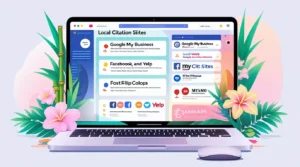How AI Tools Can Help You Find Trending Keywords for Better Content
The world of SEO is always shifting, and staying ahead is crucial. Trending keywords can drive traffic, boost visibility, and enhance engagement. With AI technology, identifying these valuable keywords becomes easier than ever.
Jump to
ToggleIn this post, we’ll explore how to use AI to identify trending keywords, delve into AI SEO tools and techniques for trending keyword analysis, and share practical strategies to boost your content game. Get ready to become an AI keyword wizard!
What Are Trending Keywords, and Why Do They Matter?
Let’s start with the basics—because even Einstein had to learn his ABCs.
What Are Trending Keywords?
Trending keywords are search terms experiencing a surge in popularity over a specific period. Think of them as the hottest gossip in the SEO world—everyone’s talking about them.
For instance, during major events like the FIFA World Cup or the Oscars, terms like “World Cup schedule” or “Oscars 2024 nominees” trend because people are actively searching for them.
Why Are Trending Keywords Important?
Trending keywords help you ride the wave of user interest. By leveraging them, you can:
- Drive traffic: People are already searching for these terms.
- Boost engagement: Readers are more likely to click on relevant, timely content.
- Improve rankings: Fresh, keyword-rich content signals relevance to search engines.
So, if you want your blog or website to shine, hopping on the keyword trend train is a must.
The Importance of Keyword Research in SEO
Keyword research is the foundation of every successful SEO campaign. By understanding what users are searching for, businesses can create content that meets their audience’s needs. Traditional methods of keyword research often involve manual processes and reliance on outdated tools. Enter AI SEO tools, which revolutionize this process by automating keyword discovery, analyzing trends, and predicting future opportunities.
With AI for SEO keywords, marketers can now:
- Uncover trending keywords AI in real-time.
- Conduct content keyword research with unparalleled efficiency.
- Optimize for search engines using AI search optimization.
How AI Enhances Keyword Research
1. Automated Keyword Generation
Traditional keyword research tools required manual input and extensive data analysis. With an AI keyword generator, the process becomes seamless. AI algorithms analyze massive datasets to suggest keywords that align with user intent, search volume, and competitiveness.
For instance, tools using keyword research AI can:
- Analyze competitors’ strategies.
- Identify high-converting long-tail keywords.
- Highlight opportunities for underutilized niches.
2. Real-Time Trend Analysis
Understanding trends is vital in SEO. AI excels in keyword trend identification by analyzing real-time data from social media, search engines, and news outlets. Using trending keyword analysis, businesses can tap into hot topics, ensuring their content stays relevant and timely.
AI-driven platforms like Google Trends, combined with AI for SEO strategies, provide valuable insights into seasonal trends and emerging topics.
The Role of AI in Blog Keyword Generation
Creating a successful blog starts with selecting the right keywords. Blog keyword generation powered by AI simplifies this process by:
- Recommending keywords tailored to your niche.
- Ensuring alignment with user intent and search patterns.
- Optimizing for readability and relevance.
By leveraging AI, content creators can focus on crafting high-quality articles while the technology handles the heavy lifting of keyword research.
AI Tools for Blog Keyword Generation
Some notable AI SEO tools for blog keyword research include:
- SEMRush with AI Insights: For competitive analysis and topic generation.
- Ahrefs with AI Integration: To identify content gaps and keyword opportunities.
- Jasper AI: Specializes in AI-powered content ideation.
AI for Keyword Gap Analysis
AI is not only useful for discovering trending keywords, but it can also help identify keyword gaps that your competitors may have overlooked. By analyzing competitor websites and their ranking keywords, AI-powered tools can pinpoint areas where your website could outperform others in specific niches.
AI tools can:
- Identify missing keywords: Keywords that your competitors rank for but you don’t.
- Find content opportunities: Areas where your existing content can be expanded to include valuable but overlooked terms.
- Suggest related but high-impact keywords: Leverage AI to recommend content expansions or new topics you can target to improve your overall SEO strategy.
Predictive Keyword Trends with AI
AI-powered platforms are increasingly capable of predicting future keyword trends based on historical data, user behaviors, and global or local patterns. Unlike traditional keyword research, which focuses primarily on current data, predictive keyword tools help businesses plan content ahead of time, ensuring that they capture traffic as soon as a trend emerges.
Here’s how AI helps predict trends:
- Seasonal and geographic trends: AI can detect when certain keywords begin to spike based on seasonality or geography.
- Interest shifts: By analyzing vast data sets, AI can spot shifts in user interests before they reach peak volumes.
- Content gap detection: AI helps identify when a topic is gaining traction and suggests keyword opportunities to cover these topics before they become saturated.
AI and Natural Language Processing (NLP) in Keyword Context
AI tools that integrate Natural Language Processing (NLP) are enhancing keyword research by understanding the context in which keywords are used. This allows AI to find contextual keywords—phrases that may not have exact keyword matches but are related in meaning or intent.
NLP improves SEO by:
- Understanding search intent more deeply: AI can identify whether users are seeking information, making a purchase, or looking for specific services based on how they phrase their queries.
- Recommending variations of target keywords: AI suggests keywords that reflect how search engines interpret language and user queries, often offering better ranking opportunities.
- Optimizing for voice search: NLP allows AI to predict long-tail queries commonly used in voice searches, which tend to be more conversational.
Sentiment Analysis for Keyword Optimization
AI’s sentiment analysis capabilities can add another layer of sophistication to keyword research. By analyzing the sentiment behind the content associated with certain keywords, AI tools can help identify which keywords generate positive or negative sentiment among users.
AI can:
- Identify keyword sentiments: Tools assess whether the sentiment around a keyword is favorable or unfavorable, guiding businesses to target keywords with a positive user sentiment for better engagement.
- Optimize brand perception: By analyzing sentiment around trending topics, businesses can craft content that resonates more with their audience, building a stronger brand image.
- Evaluate customer opinions: AI can gauge public opinion by scanning social media, forums, and product reviews, enabling marketers to fine-tune their keyword strategies accordingly.
AI in Multi-Language Keyword Research
As businesses expand globally, targeting multiple languages and regions becomes critical. AI-powered tools have made multi-language keyword research easier than ever before. These tools analyze search data in different languages, helping marketers identify keywords that will work in specific regions or cultural contexts.
Key benefits include:
- Localized keyword generation: AI can help find region-specific keywords that users are searching for, ensuring that content is tailored to the local audience.
- Avoiding translation issues: AI tools can suggest native language equivalents of keywords, ensuring they are contextually appropriate for different cultures.
- Understanding local trends: AI can analyze trends that are specific to certain geographical areas, providing businesses with actionable insights into emerging local keyword opportunities.
AI-Powered Link Building through Keyword Insights
Link building is a critical component of SEO, and AI is revolutionizing this area by providing keyword insights that help you acquire high-quality backlinks. By analyzing keyword difficulty and competition, AI tools can suggest link-building strategies that maximize the value of backlinks.
How AI can help with link building:
- Identifying link opportunities: AI can analyze which websites are ranking for your target keywords and uncover backlink opportunities.
- Content gap analysis for link acquisition: AI suggests keywords that competitors rank for but haven’t acquired backlinks to, enabling you to target these areas to secure valuable inbound links.
- Automated outreach: Some AI platforms can automate outreach based on the keyword analysis, allowing businesses to quickly pitch relevant content to high-authority websites in their niche.
AI for Influencer and Brand Collaboration
AI-driven keyword research tools also enhance influencer marketing and brand collaborations by analyzing the keywords influencers are using in their content. By identifying these trending keywords, brands can collaborate with influencers who are discussing high-impact topics and target niche audiences effectively.
Here’s how AI helps in this area:
- Discover influencers using targeted keywords: AI identifies influencers who are ranking for or using keywords relevant to your brand, allowing businesses to reach out for collaboration.
- Measure influencer engagement: AI tracks which keywords influencers are associated with and the engagement they generate, ensuring that your brand collaborates with the most impactful voices.
- Optimize campaigns with AI-driven insights: By using AI to analyze the effectiveness of influencer campaigns, brands can refine their strategies based on keyword performance and audience reaction.
AI for Content Clusters and Pillar Pages
AI can help with creating content clusters around specific keyword themes, making your website’s structure more SEO-friendly. By identifying groups of related keywords, AI can help you organize content into clusters that reinforce your website’s authority on a given topic.
Here’s how AI assists in content clustering:
- Keyword mapping: AI tools can automatically group related keywords into clusters, suggesting pillar content and subtopic pages.
- Improved content architecture: AI helps design website architecture that prioritizes internal linking between pillar pages and cluster pages.
- Enhancing topical relevance: AI ensures that all content within a cluster is thematically connected, boosting your website’s topical authority and increasing the chances of ranking higher for multiple keywords.
AI for Long-Tail Keyword Discovery
Long-tail keywords are highly effective for targeting specific user intent, but they can be hard to find. AI helps uncover long-tail keywords that are low in competition but highly relevant to your niche.
AI-powered tools can:
- Uncover variations: AI can suggest numerous long-tail keyword variations based on the seed keyword, helping you cover a broader range of search queries.
- Optimize conversion rates: Since long-tail keywords are more specific, they tend to have higher conversion rates. AI identifies the ones that are most likely to attract qualified leads.
- Analyze user behavior: AI can predict the exact language users are likely to use, helping you optimize long-tail keywords for higher engagement.
AI for Video Content Keyword Research
As video content becomes an integral part of digital marketing strategies, AI for video SEO is becoming increasingly important. AI tools now allow you to conduct keyword research specifically for video platforms like YouTube, optimizing your video titles, descriptions, and tags to improve visibility.
AI enhances video keyword research by:
- Analyzing YouTube trends: AI can identify trending keywords on YouTube and recommend them for video optimization.
- Tagging optimization: AI tools can suggest tags that improve video searchability on platforms, helping videos reach a broader audience.
- Engagement insights: By analyzing the keywords that drive the most engagement in videos, AI can suggest content optimizations to improve views and interaction rates.
AI for SEO Keywords: A Game-Changer
The introduction of AI for SEO strategies has transformed how businesses optimize their websites. AI-powered systems analyze user behavior, search intent, and industry trends to recommend actionable keywords.
Benefits of Using AI for SEO Keywords
- Speed and Accuracy: AI tools process data faster than humans.
- Deep Insights: Gain comprehensive metrics on keyword difficulty, CTR potential, and ROI.
- Scalability: AI can handle multiple campaigns simultaneously, making it perfect for agencies.
How to Perform Trending Keyword Analysis Using AI
Trending keywords can significantly impact your site’s traffic and engagement. To identify these effectively, follow these steps:
1. Start with an AI Keyword Generator
Tools like Surfer SEO or Keyword Tool AI provide a quick way to identify trending terms. Simply input a seed keyword, and the AI suggests relevant phrases.
2. Leverage AI for Search Optimization
Combine your trending keywords with AI search optimization to ensure that your content ranks. This involves analyzing SERP features, user behavior, and backlink profiles.
3. Monitor Trends Continuously
Platforms like BuzzSumo and Google Trends, enhanced with AI, allow you to stay updated on evolving trends. Schedule periodic checks to ensure your content aligns with current demands.
Best Practices for AI-Powered Keyword Analysis
When using AI-powered keyword analysis, it’s crucial to maintain a balance between automation and human oversight. Follow these best practices to maximize results:
1. Integrate Latent Semantic Indexing (LSI) Keywords
AI tools often recommend LSI keywords, which are semantically related terms. Use these to enhance your content’s relevance without overloading it with exact-match phrases.
2. Diversify Your Sources
Don’t rely on a single tool. Combine insights from multiple AI SEO tools to get a well-rounded view of the keyword landscape.
3. Focus on Intent-Based Keywords
AI excels in understanding user intent. Use this capability to identify keywords that match informational, transactional, or navigational queries.
Tools for AI-Driven Keyword Research
1. Ahrefs with AI
This tool combines traditional SEO metrics with AI-powered recommendations. It’s excellent for competitor analysis and finding content gaps.
2. SEMrush Keyword Magic Tool
SEMrush uses AI to suggest long-tail keywords and analyze their potential.
3. Google AI-Powered Keyword Planner
Google’s Keyword Planner now incorporates AI, offering predictive insights and trend analysis.
4. AnswerThePublic (Enhanced by AI)
Discover questions and topics people are searching for, enriched with AI-driven data.
The Future of AI in Keyword Research
AI’s role in SEO is expected to grow exponentially. With advancements in machine learning and natural language processing, future AI for keyword research tools will become even more intuitive and precise.
Key Predictions:
- Voice Search Optimization: AI will help identify keywords tailored for voice queries.
- Personalized Keyword Insights: Tailored suggestions based on user profiles and preferences.
- Integration with IoT Devices: AI will analyze search data from smart devices to predict trends.
Conclusion
Incorporating AI for keyword research into your SEO strategy is no longer optional—it’s essential. With tools that provide AI-powered keyword analysis, businesses can identify trending keywords AI, optimize their content with precision, and stay ahead of the competition. From blog keyword generation to keyword trend identification, AI simplifies complex processes, allowing marketers to focus on crafting impactful content.
By leveraging these insights, you can create a robust SEO strategy that not only drives traffic but also engages and converts your audience. Start integrating AI into your keyword research today and experience the difference it makes.
If you have any questions or insights about using AI for SEO, feel free to leave a comment below. Let’s discuss how AI can revolutionize your approach to content keyword research!






